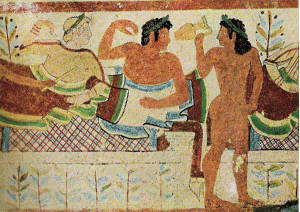One of the main themes of my book is the exploration of the lives of women in the classical period of C5th and 4th BCE through the characters of a Roman girl, Greek slave, Cretan courtesan and Etruscan matron.
So what was the status and role of these women in classical times? In both Greece and Rome they were chattels possessed by men. Athenian women were cloistered within women’s quarters and were restricted to household duties. In Rome they were second class citizens without the right to vote or hold property. What’s more, Roman women rarely ate with their men and could be killed with impunity by their husbands or fathers for adultery or drinking wine.
In both cultures a woman’s primary purpose was to bear children in order to ensure the continuation of her husband’s bloodline. Their identities were defined by their relationship as either daughter or wife. Roman women were only known by one name, that of their father’s surname in feminine form. In death their remains were placed in a man’s tomb and they were not commemorated.
Furthermore, while wives weren’t given the opportunity for education and social freedom – in Athens, courtesans were. These hetairae were allowed to dine with men and drink wine at banquets while discussing politics, philosophy, literature and enjoying entertainments. Of course they also provided sexual favours to the patrons who owned them.
Discovering this made me realize that gender inequality is still prevalent today and varies only by degree. Many rights that women of the western world take for granted such as education, suffrage and property ownership have only been acquired in relatively recent times. Certainly the concept of women being either ‘damn whores or god’s police’ is still held by many cultures.
Etruscan women were believed to hold positions as high priestesses and even conduct businesses. They could share their husband’s dining couch and drink wine. They had two names denoting both paternal and maternal bloodlines. Some accounts also state that wives had sexual freedom and may even have been able to claim their illegitimate children in their own right.




Leave a Reply